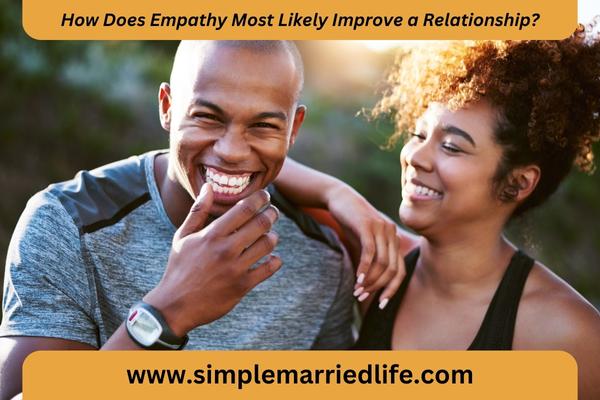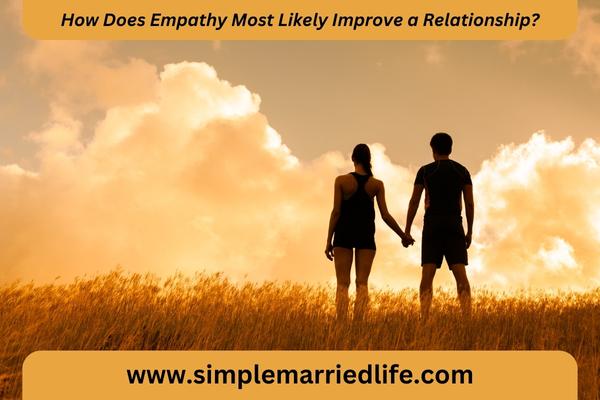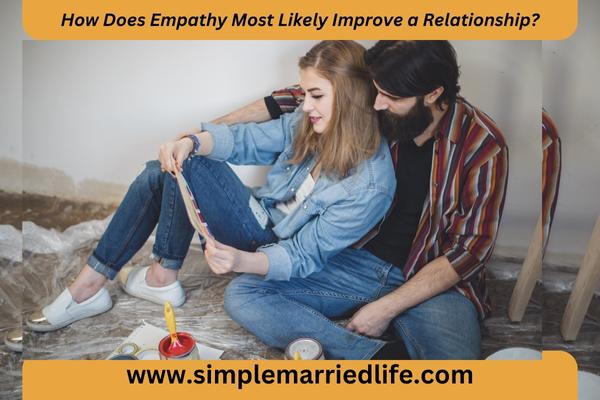The ability to empathize with your partner’s feelings and experiences lays the foundation for a strong, fulfilling relationship. By cultivating empathy, you promote better communication, increased intimacy, effective conflict resolution, mutual support, and overall relationship satisfaction.
In this blog article, we will explore what empathy really means, why it matters so much in a partnership, and how you can become a more empathetic partner.
You’ll learn specific techniques for enhancing perspective-taking, validating emotions, and deepening your understanding of your partner’s inner world. We also discuss common roadblocks to empathy and how to overcome them. Read on to gain insight into how true empathy can profoundly transform your relationship for the better.
What is Empathy?
Empathy is the ability to understand and share the feelings of another person. It involves seeing things from your partner’s perspective, putting yourself in their shoes, and identifying with their emotions.
True empathy goes beyond sympathy, which is feeling concern for someone. Empathy is feeling what they feel.
There are three key components of empathy:
- Cognitive empathy – Understanding what another person is thinking or feeling. This involves perspective-taking.
- Affective empathy – Actually experiencing the emotions of another person. Feeling what they feel.
- Compassionate empathy – Taking action to help after empathizing. Showing care and concern.
Empathy allows you to connect to your partner’s inner experience. You move from an intellectual understanding to an emotional sharing.

Why is Empathy Important in Relationships?
Empathy is the key to building strong emotional bonds between partners. Developing empathy leads to greater intimacy, trust, communication, and overall satisfaction in a relationship.
1. Empathy Cultivates Emotional Intimacy
When partners make the effort to understand and share each other’s experiences, it allows them to be more vulnerable and open up on a deeper level. Feeling your partner empathizes with you promotes a sense of safety in the relationship. You become comfortable expressing your true thoughts and emotions without fear of judgment or rejection. This emotional intimacy brings you closer.
2. Empathy Fosters Trust Between Partners
Empathetic partners are able to develop higher levels of trust. When you consistently show your partner that you care about their feelings and are there for them, it establishes reliability. Your partner feels secure depending on you as their rock during difficult times, which builds trust.
3. Empathy Enhances Communication
Making the effort to understand your partner’s perspective increases mutual understanding during conversations. Rather than talking past each other, empathy facilitates open and emotionally connected dialogue. Partners feel heard and understood.
4. Empathy Allows for Healthy Conflict Resolution
Empathy enables couples to navigate disagreements constructively. Tapping into each other’s emotions prevents escalation and promotes compromise. Conflicts are resolved fairly, without lingering resentment.
5. Empathy Promotes Forgiveness
Empathetic partners are able to let go of grudges more easily because they grasp each other’s motivations and feelings. This understanding breeds forgiveness rather than harboring bitterness.
6. Empathy Provides Emotional Support
Letting your partner know you understand their feelings makes their burdens feel lighter. Your empathy offers validation and comfort during stressful times.
7. Empathy Encourages Personal Growth
By tuning into your partner’s core desires and motivations, an empathetic partner can nurture your self-actualization in a tailored way. They support your growth.
8. Empathy Leads to Relationship Satisfaction
Research confirms empathy is strongly correlated with happiness and fulfillment between partners. Feeling emotionally valued and understood enriches the relationship bond over time.

How to Be More Empathetic Towards Your Partner
Empathy can be learned and strengthened. Here are some tips on how to cultivate empathy in your relationship:
1. Listen Actively
Practice active listening when your partner is speaking. Maintain eye contact, nod along, and avoid distractions. Focus completely on understanding their perspective without thinking about your response.
2. Ask Questions
Ask thoughtful follow-up questions to gain clarity on your partner’s feelings and experiences. Don’t interrogate them. Show genuine interest in learning more about their inner world.
3. Paraphrase
Paraphrase what your partner said to show you comprehended. For example, “It sounds like you felt anxious about that work presentation.” This demonstrates that you processed their emotions and validates how they feel.
4. Express Understanding
Let your partner know that you understand their perspective and feelings. For example, “I can see why that situation was upsetting for you.” Put their feelings into words to display comprehension.
5. Avoid Judgement
Refrain from judging or criticizing your partner’s emotions and reactions. Even if you disagree, take a non-evaluative stance. Your role is to understand their inner experience, not assess whether their feelings are rational or valid.
6. Validate Their Feelings
Affirm that your partner’s feelings make sense by saying things like, “You have every right to feel that way.” Let them know their emotions are real and important, even if you feel differently.
7. Sit With Discomfort
Tolerate difficult emotions that arise when your partner shares challenging experiences. Don’t try to fix or rescue them. Allow yourself to feel discomfort as you bear witness to their pain and vulnerability.
8. Offer Comfort
After listening, offer words of comfort, give a hug, or simply be present with them. Provide consolation without overshadowing their experience. This demonstrates compassion and lets your partner know they are not alone.
9. Follow Their Lead
Some people may not want advice or a deep discussion after opening up. Follow their lead on what they need in the moment. Ask what would be most helpful and respect those boundaries.
10. Walk in Their Shoes
Try to imagine yourself in your partner’s situation. How would you feel and what would you want? Envisioning their perspective helps you connect to their emotional experience.

Barriers to Empathy in Relationships
There are various roadblocks that can inhibit empathy from developing within a relationship:
1. Invalidation
When partners deny or disregard each other’s experiences and feelings, it shuts down emotional sharing. Dismissive comments like “You’re overreacting” convey that one’s feelings are not valid or real. This lack of validation prevents intimacy.
3. Poor Listening
Partners who do not pay attention fully or frequently interrupt when the other is sharing make it impossible to empathize. The speaker feels ignored and that their emotions do not matter, stymying empathy.
3. Lack of Curiosity
Showing little interest in understanding your partner’s inner world through asking questions and wanting to learn more about their perspectives reflects disinterest. Without curiosity, you remain oblivious to their feelings.
4. Judgement
Criticizing your partner’s emotions by saying they are silly, irrational, or wrong demonstrates a lack of empathy. Partners must be able to share feelings without external evaluation. Judgement says “your feelings are wrong” rather than seeking to understand them.
5. Defensiveness
When partners react protectively, lash out, or retaliate in response to expressions of vulnerability, it shuts down emotional sharing. Defensiveness conveys that emotions will be weaponized, preventing trust and empathy.
6. Distractions
Constant distractions like technology get in the way of giving your partner full, engaged attention. Preoccupation inhibits connecting emotionally during conversations and sharing of feelings.
7. Communication Differences
Partners who have very different innate communication styles and cues struggle to read each other accurately. What is expressed may not align with what is understood, impeding mutual understanding.
8. Trauma
Individuals’ past trauma can impact their ability to open up or trust others’ empathy. Emotional wounds may cause them to shut down, struggle with being vulnerable, or have difficulty believing a partner’s empathy is real and safe.

How Empathy Improves Aspects of a Relationship
Integrating empathy into various domains of a relationship can profoundly enhance partnership:
Conflict Resolution
Applying empathy when disagreeing enables better conflict resolution. Understanding each other’s perspectives and emotions prevents escalation by identifying core issues. Compromise becomes easier when both feel understood.
Physical Intimacy
Tuning into a partner’s desires and needs fosters a more satisfying physical connection. Mutual empathy helps partners read reactions and cultivate sensual intimacy.
Co-Parenting
Co-parents who empathize with each other’s challenges regarding the kids present a more unified front. Modeling empathy also teaches children relationship skills.
Supporting Passions
Empathizing with what motivates your partner’s dreams and interests makes you more encouraging and invested. You understand the deeper meaning behind their passions.
Shared Responsibilities
Empathy helps couples divide tasks in ways that feel equitable based on both partners’ strengths, limitations, and needs. The workload feels cooperative.
External Stressors
During major stressors, an empathetic partner provides comfort and strength when the other feels overwhelmed. Empathy uplifts and bolsters a partner’s capacity to cope.
Family Visits
Understanding each other’s family relationship dynamics and tensions helps couples better navigate visits together. Empathy for each partner’s experience makes cooperation easier.
Major Decisions
Big decisions affect partners differently based on individual needs. Mutual empathy leads to wiser decision-making that works for both, rather than unilateral choices.

Developing More Empathy in Your Relationship
Here are some habits to build empathy:
- Set the intention to be more empathetic and make it a priority.
- Observe your partner’s emotions and make a point to ask about feelings.
- When your partner shares an experience, try saying “Help me understand how you feel.”
- After an argument, reflect on their perspectives and emotions before your own.
- Share vulnerable experiences to model openness.
- Point out when you notice your partner showing empathy towards others.
- Thank your partner when they show empathy towards you and explain how it made you feel.
- Avoid distractions and be fully present when interacting with your partner.
- If you feel yourself growing impatient, take a breath and refocus.
- Seek couples counseling ifyou need help removing roadblocks to empathy.
The Rewards of Empathy in Relationships
Integrating more empathy will help you become a better partner. You’ll likely notice:
- Your partner opens up on a deeper level.
- Fights become productive disagreements rather than attacks.
- You provide each other with emotional support easier.
- Shared joyful moments become amplified.
- Your partner feels safe being vulnerable around you.
- Everyday interactions feel more positive.
- You sync up on likes, dislikes, needs, and goals.
- Your partner feels valued, understood, and cared for.
- Increased closeness, trust, and relationship satisfaction develop.
- You build a meaningful connection that enriches your lives.
Conclusion
Empathy is a profound relationship strengthener. Partners who make the effort to understand and share each other’s experiences form deeper connections. They feel safe being vulnerable, supported, and understood. Practicing empathy leads to increased trust, intimacy, effective communication, personal growth, and relationship fulfillment.
It also enables couples to better manage conflict, stressors, parenting challenges, and major decisions they face together. Prioritizing empathy helps sustain happy, healthy relationships that stand the test of time. Learn here more about strong married life tips and guides.


